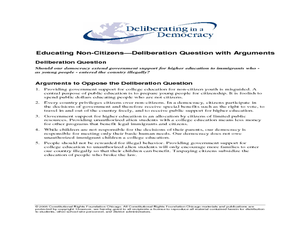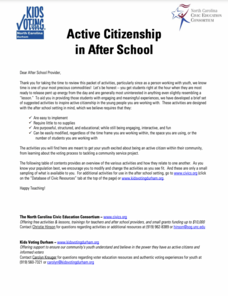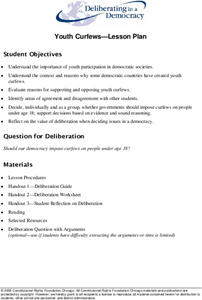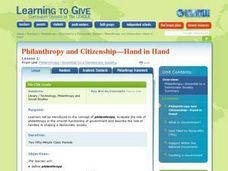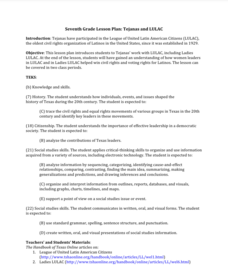Deliberating in a Democracy
Educating Non-Citizens
Learners distinguish between the privileges of being a U.S. Citizen and privileges that are forfeited if not a U.S. Citizen. For this history lesson, students analyze the rights of people in a democratic society through research,...
Facing History and Ourselves
Citizen Watchdogs and the News
To conclude their case study of media coverage of the shooting of Michael Brown by a Ferguson, Missouri, police officer, class members consider the role of citizen watchdogs in a democratic society, develop strategies for combating...
Museum of Tolerance
Citizenship Then and Now: Comparing Ancient Rome and Contemporary American Society
Class members research citizenship in Ancient Rome and in the United States and use the provided graphic organizers to compare the rights and responsibilities of citizens in these two democracies.
Carolina K-12
Active Citizenship in After School
Active citizenship is the bedrock of any great democracy. Continue the trend by teaching the next generation about voting rights and the functions of elections in society. The variety of activities in the resource includes a human...
Museum of Tolerance
The Role of Citizens in a Participatory Democracy
Groups research participatory democracies and compare the role and rights of citizens in ancient history with those in recent U.S. history. Guided by a series of questions, individuals compose a persuasive essay in which they discuss the...
Curated OER
A River Ran Wild: An Environmental History
The Nashua River serves as the focal point of an investigation of the treatment of and care for natural resources. A reading of A River Rand Wild: An Environmental History by Lynne Cherry, launches the study and class members consider...
Museum of Tolerance
Documents That Shape Society
The Bill of Rights is a foundational document of American democracy, much like the Nuremberg Laws were a foundational document of the Reichstag of Nazi Germany. But that's where their similarities end. Engage high schoolers in a...
Close Up Foundation
Rights Auction
In an engaging activity on universal and unalienable rights, learners work in groups to establish a democratic nation and determine what principles they want to protect to ensure a democratic society. They conduct a "rights auction" in...
What So Proudly We Hail
The Meaning of America: Enterprise and Commerce
Using Mark Twain's The Man That Corrupted Hadleyburg, invite your learners to consider the concept of virtue in a democratic society devoted to gain and self-interest. This stellar resource guides your class members through a close...
Deliberating in a Democracy
Youth Curfews
Don't stay out too late! Scholars analyze the need for youth curfews in a democratic society. They examine primary documents, case studies, and short video clips to form their opinions and take a position on the issue. Holding a class...
Facing History and Ourselves
The Audacity of a Vote: Susan B. Anthony’s Arrest
Susan B. Anthony's speech "Is It a Crime for Women to Vote?" takes center stage in a lesson that asks class members to consider how they might respond to what they consider an unjust law. Groups work through the speech paragraph by...
Curated OER
Barnyard Protest: Cows, Chickens & Fundamental Freedoms
Here is an ambitious and engaging lesson that should help elementary schoolers begin to develop a basic understanding of human rights. Pupils are asked to think about their own rights, the rights of others, and how an individual's voice...
Curated OER
American Government
Challenge your students with this lesson on American government! Learners discuss the three branches of government and its responsilbities, and then go on to more complex critical-thinking activities. Students interview members of the...
National Endowment for the Humanities
Revolution '67, Lesson 1: Protest: Why and How
To some people, protesting is as American as apple pie, but the factors that lead to protests can be as confusing to veteran activists as to today's youth. Revolution '67 explores the riots in Newark, New Jersey as a case study. ...
Judicial Learning Center
Law and the Rule of Law
We hear a lot about the importance of the rule of law, but most people do not really know what those words mean. The lesson is a webpage that defines the rule of law, explains why it is important in a democratic society and provides...
Curated OER
Philanthropy and Citizenship-Hand in Hand
High schoolers define philanthropy and evaluate how the government would functin without the help of volunteers. They write song lyrics, participate in a class discussion, and complete a Venn diagram.
Curated OER
Community Treasures (Rivers and Trees): An Integrated Curriculum Unit
Third graders demonstrate an understanding of geography and its effects on lifestyles and culture. Then they apply basic economic terms and principles
and identify the United States government and history. Students also identify and...
Curated OER
What does it mean to be a citizen?
Students examine democracy and the role of a citizen. They contrast rights and responsibilities of individuals, groups, and organizations. Students identify two forms of democratic action and describe demoncratic values. Students observe...
Curated OER
Ben Franklin the Good Citizen
Students investigate Benjamin Franklin's contributions to society. In this history lesson, students read about Franklin's philanthropic behavior and play a bucket brigade game to re-enact how fires were put out during colonial times.
Texas State Historical Association
Tejanas and LULAC
Seventh graders explore the Latino Civil Rights Movement. In this civil rights lesson plan, 7th graders discover the role of the League of United Latin Citizens (LULAC) as well as the women's arm of the organization and write essays that...
Curated OER
Children's Rights
Students research studenT rights in democratic and non-democratic societies. They create group projects such as advertisements and posters, which demonstrate their awareness of civic involvement.
Curated OER
Affects of Prejudicial Attitudes
Second graders explore the concept of cultural assimilation. They study the affects of prejudice on the authors of Curious George (Margret & H. A. Rey). They communicate ideas and opinions of the rights and responsibilities of...
Curated OER
The Void Filled by Nonprofits
Students examine the significance of nonprofit organizations in a democratic society. They conduct research on a selected nonprofit organization, complete a questionnaire, and present their findings to the class.
Curated OER
Character Traits
Explore character traits using this resource. After reading the story Goldilocks and the Three Bears, learners fill in a graph identifying character traits. Then, they write and put on a skit. This resource provides a motivating way to...


